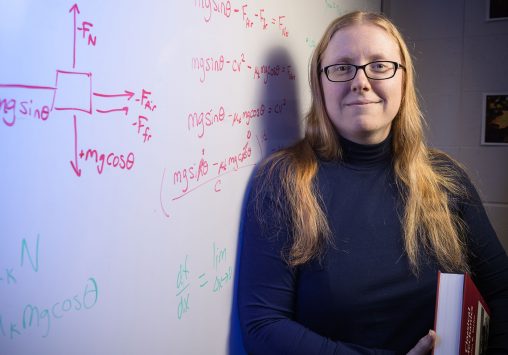
Adrienne Traxler, associate professor of physics at Wright State, is researching the sources physics faculty members are using to master remote teaching, including people, websites and social media.
The National Science Foundation has awarded Adrienne Traxler, associate professor of physics at Wright State University, a rapid-response grant to investigate how physics instructors around the nation have managed the transition to remote teaching.
The $15,000 grant, awarded May 12, is supporting a study titled Faculty Networks Supporting Rapid Transitions to Online Physics Teaching During the COVID-19 Pandemic.
Traxler and collaborator Eric Brewe want to learn about the sources physics faculty members use to master remote teaching, including people, websites and social media.
“Along with mapping those networks, we want to see whether faculty members’ network connectivity is related to their anxiety level and self-efficacy in this teaching transition,” said Traxler. “In other words, has being well-connected helped people to cope with the challenges?”
In awarding the grant, the National Science Foundation said additional research from surveys, interviews and social media analysis is needed to understand these informal faculty networks and to link these networks to outcomes for faculty and students.
Traxler said one big challenge for physics faculty is teaching lab courses remotely.
“Things like taking measurements, seeing physical phenomena play out in front of you — that’s hard to move online,” she said. “There are some resources to help at the introductory level, but in advanced lab courses there may be little or nothing online to help.”
In many physics classes, she said, being able to quickly sketch a diagram or work through an equation on the board is a fundamental part of answering student questions.
“That’s harder to do online without extra software or equipment, all of which takes extra time to learn,” she said. “The same thing affects students going the other way — if they have a question, they often have to take a picture and send it to me before I really know what they’re asking.”
Traxler believes that many physics departments haven’t been pushing as much toward online instruction as some other fields have.
“We have things like the online astronomy class, but the lab requirement has been a strong argument to keep most of our other courses offline,” she said. “That’s true in many physics departments around the country. So I think physics faculty, on average, may have less preparation for teaching online than some other fields.”
Traxler said she was not prepared for how much longer grading takes when teaching remotely. And she said downloading student work, renaming files, learning various markup tools to comment on their work, and putting together recordings for students to listen also take a lot of time.
“I really appreciate the effort that my students this semester put into making it work,” she said. “It was a tough situation and not what any of us wanted, but they were very understanding of all the challenges and worked with me to get through the spring term.”
Traxler has sent surveys to thousands of faculty in physics departments around the country. She hopes to get at least 500 responses and so far has more than 300. She intends to interview about 30 of the respondents to get more in-depth answers.
“It seems like faculty have plenty to say about their experiences, and an open-response section at the end of the survey gives them a place to share that,” she said. “With this research project, I’m hoping to learn how my colleagues and I can better support each other as instructors.”

 Milling around
Milling around  Wright State recognizes Nursing Professor Kim Ringo for advancing international student success
Wright State recognizes Nursing Professor Kim Ringo for advancing international student success  Wright State honors graduating students for distinguished doctoral dissertations
Wright State honors graduating students for distinguished doctoral dissertations  Top 10 Newsroom videos of 2025
Top 10 Newsroom videos of 2025  Museum-quality replica of historic Hawthorn Hill donated to Wright State
Museum-quality replica of historic Hawthorn Hill donated to Wright State 